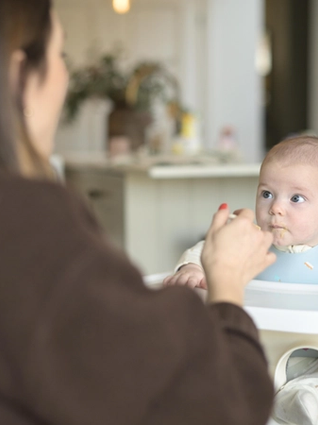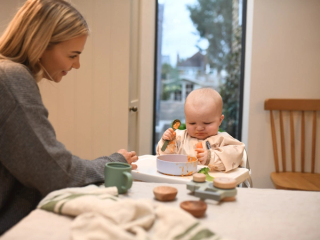
- Home
- Advice Hub
- Baby
- Weaning
- When To Start Weaning?
When to start weaning?
Our Paediatric Dietitian shares the tale-tell signs that your little one might be ready to start weaning onto solid foods!
Weaning your baby is about so much more than nutrition. It is a period of learning, exploring and developing eating habits. We're here to help you decide when and how to start to give you the best beginning to this very exciting chapter As we take you through your weaning journey, from from first tastes through to family meals, you will start to learn two very important things: what to feed and also how to feed, which is a very important piece of the puzzle.
What age should you start weaning?
Knowing when your baby is developmentally ready for solid food can feel like a confusing time. You may be getting information fired at you from all angles – friends, family, social media. People are usually well-meaning, but you’re the person who knows your baby best.
The World Health Organisation and the Department of Health in the UK both recommend starting solids at around 6 months. This doesn’t need to be exact, which is why the recommendation is ‘around’ 6 months. However, you shouldn’t start before 17 weeks / 4 months as your baby won’t be ready.
All babies are different and 6 months is a rough guide. It’s better to focus on the signs of readiness than a specific age.
Signs of weaning readiness
There are three main signs of readiness. If your baby is around 6 months old and is displaying all three of these, then you are fine to start offering food:
- Being able to sit up steady in a high chair with good head control. This reduces the risk of choking.
- Picking objects up and putting them in their mouth. This shows that they are developmentally ready for feeding.
- Tongue thrust reflux is gone. The tongue thrust is a reflex where the tongue pushes out anything that goes into the mouth to prevent choking. You may have seen them doing this with things like medicine you’ve had to syringe in. The loss of this reflex indicates that they are ready for swallowing foods.
Other things happening which AREN’T signs of readiness!
Between 4-6 months your baby may reach a few milestones that produce new behaviours. These may be related to feeding, but are not signs that your baby is ready.
- Waking up at night: between 4 and 6 months some babies may start waking more at night even if they were sleeping more consistently previously. Although many parents think that introducing food will help their baby sleep longer, the evidence doesn’t agree, and the evidence there is shows a very slight difference in sleep times!
- Being interested in food at the table: although showing an interest is a positive sign and an indication that your baby is getting ready to start eating, it is not a sign on its own.
- Being a big baby! Research indicates that bigger boys tend to be offered solid food earlier than small girls. We are here to reassure you that even if your baby is bigger, they don’t need solid food earlier; they will just need more milk than other babies. Developmentally, they will be the same so the advice remains the same regardless of size.
Reasons to start before 6 months
Some babies may be advised to start early by healthcare professionals. We can’t advise whether your baby comes under these categories, but if you think they do we recommend speaking to your health visitor or GP.
Allergies: If your baby is at high risk of food allergy, introducing egg and peanut at 4 months can reduce the chances of them developing allergies to these foods. Signs that your baby is at higher risk of allergies include having severe eczema before 6 months and already having a food allergy such as cows’ milk protein allergy.
Reflux: Sometimes babies with severe reflux affecting their quality of life are advised to start the weaning process early. For some babies this helps reduce symptoms, others it makes no difference and for some it may even make it worse. You should be guided by a healthcare professional to know whether this is a step you should try with your baby.
Premature babies
If your baby is born prematurely – before 37 weeks’ gestation – you have probably heard healthcare professionals talking about your babies actual and gestational age, which for some parents can cause some confusion.
Actual age: the age your baby is according to their actual birth date.
Corrected age: the age your baby would be if we used their predicted due date
For example if your baby was born at 28 weeks, at 26 weeks (6 months) they would be:
Actual age: 26 weeks
Corrected age: 14 weeks
Advice for weaning a healthy premature baby is pretty much the same as a full term baby. You should look for the signs of readiness above and although there is not a huge amount of evidence, the recommended earliest start date is 4 months or 17 weeks corrected. If your baby has ongoing needs secondary to their prematurity you may need to get advice from a healthcare professional for a more personalised plan for your little one.
Once you start your weaning journey with your baby, you can move forward as you would do with a full term baby. You may be at a slightly different time point to other babies but the information we share in this guide will be relevant to you and your baby.
Advice & tips

Want to read more? Join the HiPP BabyClub for full access to this article.
As a BabyClub member, you'll get access to a range of exclusive benefits, including:
Monthly competitions
Discounts from our Partners
Expert advice tailored to your little one's age
Weaning recipes
HiPP shop discounts*
*10% off HiPP's online shop does not apply to our First Infant, Anti-Reflux or Comfort Formula Milk.
Important notice: Breastfeeding is best. Follow on milk should only be used as part of a mixed diet from 6 months. Talk to a healthcare professional.
















